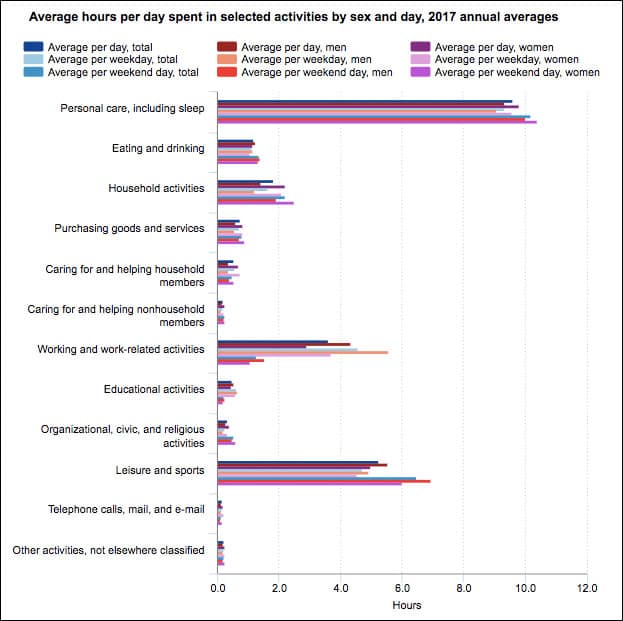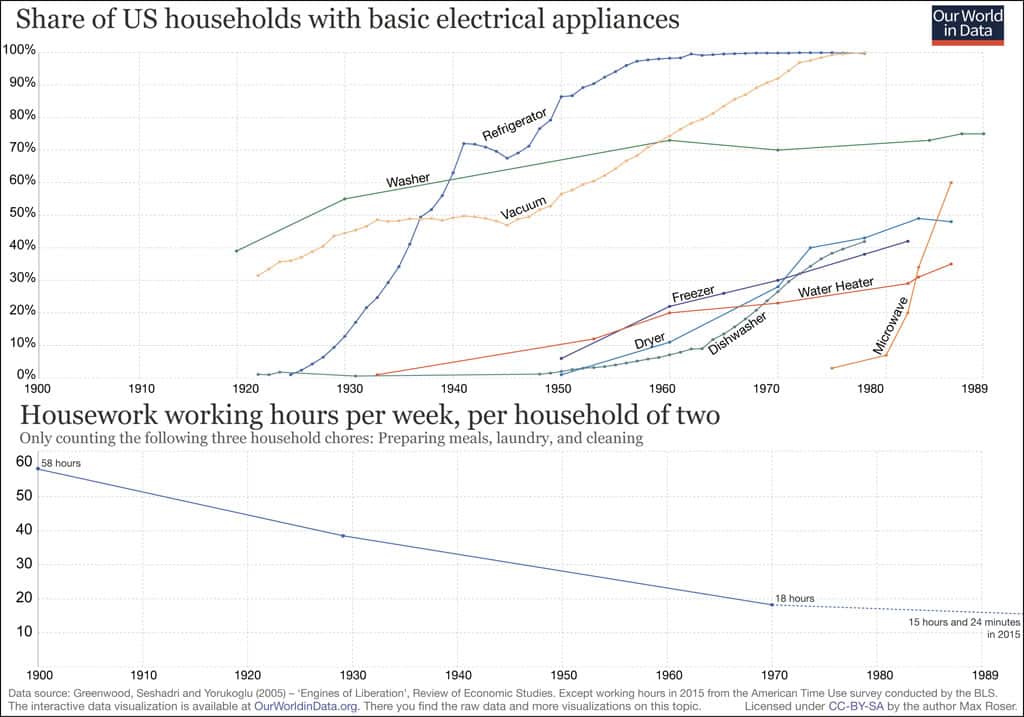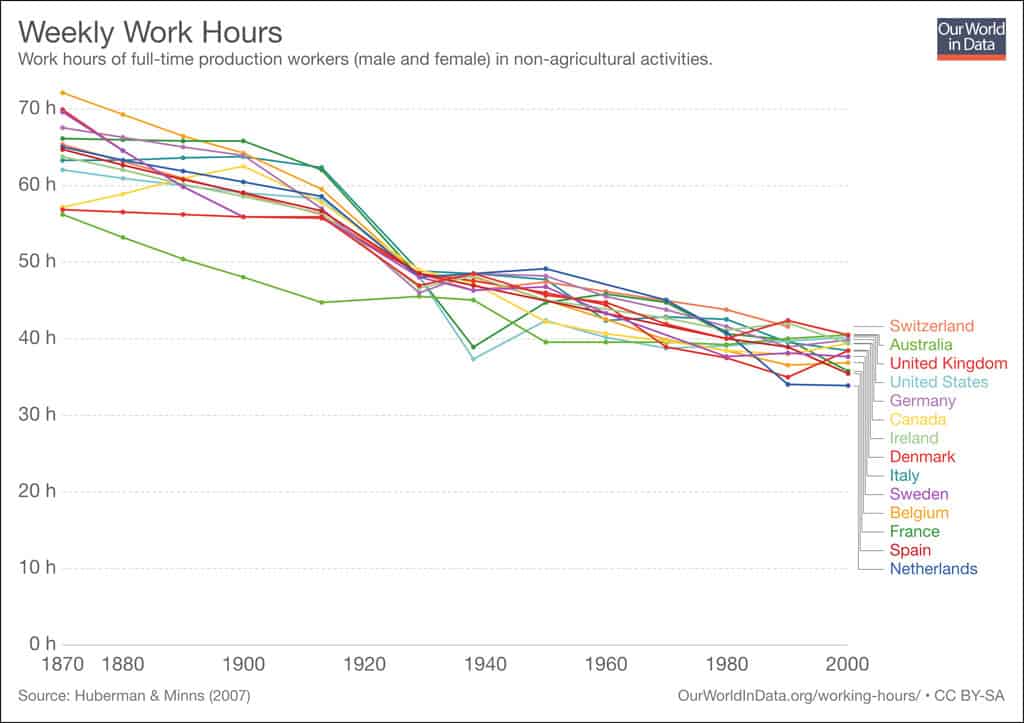
“The difficulty of describing things for Western ears is that people in a hurry cannot feel.” — Alan Watts
Isn’t it interesting how that works? We can’t feel when we are too busy. But, “too busy” is often just a feeling itself.
This is a follow-up post to the busyness post series:
- Busyness 101: Why are we SO BUSY in Modern Life? (7 Hypotheses)
- Busyness 201: A Brief History of Work & BUSY in America
- Busyness 301: The Future of BUSY, Work & Leisure
As I mentioned in the series, we feel a lot of things as it relates to our time:
- We feel like we are “pressed for time.”
- We feel like there is “not enough time in the day.”
- We feel like we are “running out of time.”
Are these just feelings? Or, are we actually as busy as we think we are?
The Busy Reality, According to Research
Unlike what you see in the news and mainstream media, we are living in an amazing time in human history. Many things are better now than they have ever been in the past (no really, they are…check out Factfulness — a book Bill Gates says is “one of the most important books I’ve ever read” and one of his favorite books of all time).
So, what’s the reality when it comes to busyness?
First, let’s look at how we spend our time. According to the US Bureau of Labor Statistics 2017 American Time Use Survey, here’s the aggregate of how we spend our time. You can slice and dice the chart here, or if you’re feeling extra ambitious, you can read the full 2017 PDF report here.

Rather see the numbers instead? Here you go (you’ll need to zoom in a bit):

No matter which way you view the data, there are clearly some trends with how we spend our time in America. The vast majority of our time is spent on just a few things: sleep/personal care, followed by leisure, and then work.


This is where things may get surprising to you. Work hours per week are not increasing for most people. In fact, like household chore time, work hours have significantly decreased over time as well.
In 1975, American sociologist Max Kaplan noted that US work hours had been declining almost 4 hours per week each decade between 1875-1975 (from 70 hours/week to 37 hours/week over the course of that century) due to automation.²
Since then, it’s flatlined:
By 1970 it had fallen to slightly less than 39 (hours/week). But then something changed. Instead of continuing to decline, the duration of the workweek stayed put; it’s hovered just below 40 hours for nearly five decades. — The Atlantic³

This is where you’ll likely be most surprised if (like me) you feel busier than ever.
Many articles reference a 2011 Gallup poll that shows the majority of Americans believe they have enough time to do what they need to do. Gallup concluded:
Taken together, the results reveal that, while a majority of working Americans report having enough time to do what they need to do, a significant proportion believe they cannot catch up with their daily obligations and needs. Specific demographic groups such as working women, parents with children in the household, and those at the top of the income spectrum are among the most likely to be time-poor. — Gallup4
Surprised? Me too. So, for those of us who genuinely believe we are busier than ever, what’s the explanation?
Why Do We Feel So Busy?
This was an aha moment for me and aligns with recent research I did on mental bandwidth.
It reminded me of a quote by monk/professor/author Haemin Sunim from his book The Things You Can See Only When You Slow Down:
Why am I so busy? When everything around me is moving so fast, I stop and ask, ‘Is it the world that’s busy, or is it my mind?’
Jack Ma, billionaire founder of Alibaba, also mentions the “thought” of busyness:
My grandfather worked 16 hours a day in the farmland and (thought he was) very busy. We work eight hours, five days a week and think we are very busy. — CNBC5
Brigid Schulte, author of the book Overwhelmed: How to Work, Love, and Play When No One Has the Time, addresses the same theme of “thinking”:
A second theory that Schulte considers is that ‘the overwhelm’ is a function not so much of how many things Americans have to do but of how much time they spend thinking about how many things they have to do. — The New Yorker6
While doing research for the busyness post series, I intentionally set aside quotes talking about feeling busy. Here’s what I found (emphasis added in bold):
- “Feelings of scarcity, whether money or time, prey on the mind, thereby impairing decision-making. When you’re busy, you’re more likely to make poor time-management choices – taking on commitments you can’t handle, or prioritising trifling tasks over crucial ones. A vicious spiral kicks in: your feelings of busyness leave you even busier than before.” — Lifehacker9
- “The result, inevitably, is feeling overwhelmed: we’re each finite human beings, with finite energy and abilities, attempting to get through an infinite amount. We feel a social pressure to ‘do it all’, at work and at home, but that’s not just really difficult; it’s a mathematical impossibility.” — BBC10
- “Managing this constant and mounting demand often involves switching tasks or multi-tasking, and the job never quite feels done…Multi-tasking is what makes us feel pressed for time.” — The Economist7
- “The tempo of life in rich countries is faster than that of poor countries. A fast pace leaves most people feeling rushed.” — The Economist7
- “The explosion of available goods has only made time feel more crunched, as the struggle to choose what to buy or watch or eat or do raises the opportunity cost of leisure (ie, choosing one thing comes at the expense of choosing another) and contributes to feelings of stress. The endless possibilities afforded by a simple internet connection boggle the mind. When there are so many ways to fill one’s time, it is only natural to crave more of it.” — The Economist7
- “A conundrum of wealth: though people may be earning more money to spend, they are not simultaneously earning more time to spend it in. This makes time—that frustratingly finite, unrenewable resource—feel more precious.” — The Economist7
- “Linder, who coined the term ‘harried leisure class,’ says that rich people feel more anxious because they feel more compelled to maximize their free time.” — The Atlantic8
- “Leisure time starts to seem more stressful, as people feel compelled to use it wisely or not at all.” — The Economist7
- “Being busy can make you rich, but being rich makes you feel busier still.” — The Economist7
- “The more education working adults have, the less likely they are to report having enough time to complete what they need to do during the day. Income, just like education, is another variable that has an inverse relationship with time or lack thereof. In other words, the more cash-rich working Americans are, the more time-poor they feel.” — Gallup4
- “The idea is that rich people have a real, even rational, sense that their time is more valuable—in the non-spiritual sense, of course—so that their wasted time feels more wasteful. If this is right, it suggests that wealth buys an expectation to maximize productivity leisure time. Which ultimately means that wealth buys anxiety. Ick.” — The Atlantic8
All of these are addressed in more detail in Busyness 101: Why are we SO BUSY in Modern Life? (7 Hypotheses).
But, I do believe that there’s one in particular that deserves special attention — one that may seem so simple but possibly have the biggest affect. The modern abundance of choice. On the surface, you may think choice is a good thing. And, that’s true up to a point. However, the “father of modern management,” Peter Drucker, saw the dark side of choice — individual responsibility:
In a few hundred years, when the history of our time will be written from a long-term perspective, it is likely that the most important event historians will see is not technology, not the Internet, not e-commerce. It is an unprecedented change in the human condition. For the first time—literally—substantial and rapidly growing numbers of people have choices. For the first time, they will have to manage themselves. And society is totally unprepared for it. — Peter Drucker
What do you think? Let me know in the comments!
Sources:
- https://ourworldindata.org/working-hours
- https://opus.lib.uts.edu.au/bitstream/10453/19821/1/lstwp9.pdf
- https://www.theatlantic.com/business/archive/2016/01/inequality-work-hours/422775/
- https://news.gallup.com/poll/148583/working-adults-strapped-time.aspx
- https://www.cnbc.com/2017/06/21/alibabas-jack-ma-says-people-will-work-four-hours-a-day-in-30-years.html
- https://www.newyorker.com/magazine/2014/05/26/no-time
- https://www.economist.com/christmas-specials/2014/12/20/why-is-everyone-so-busy
- https://www.theatlantic.com/business/archive/2014/05/the-myth-that-americans-are-busier-than-ever/371350/
- https://lifehacker.com/if-you-feel-like-youre-constantly-busy-clear-up-your-1786706897
- http://www.bbc.com/future/story/20160909-why-you-feel-busy-all-the-time-when-youre-actually-not




